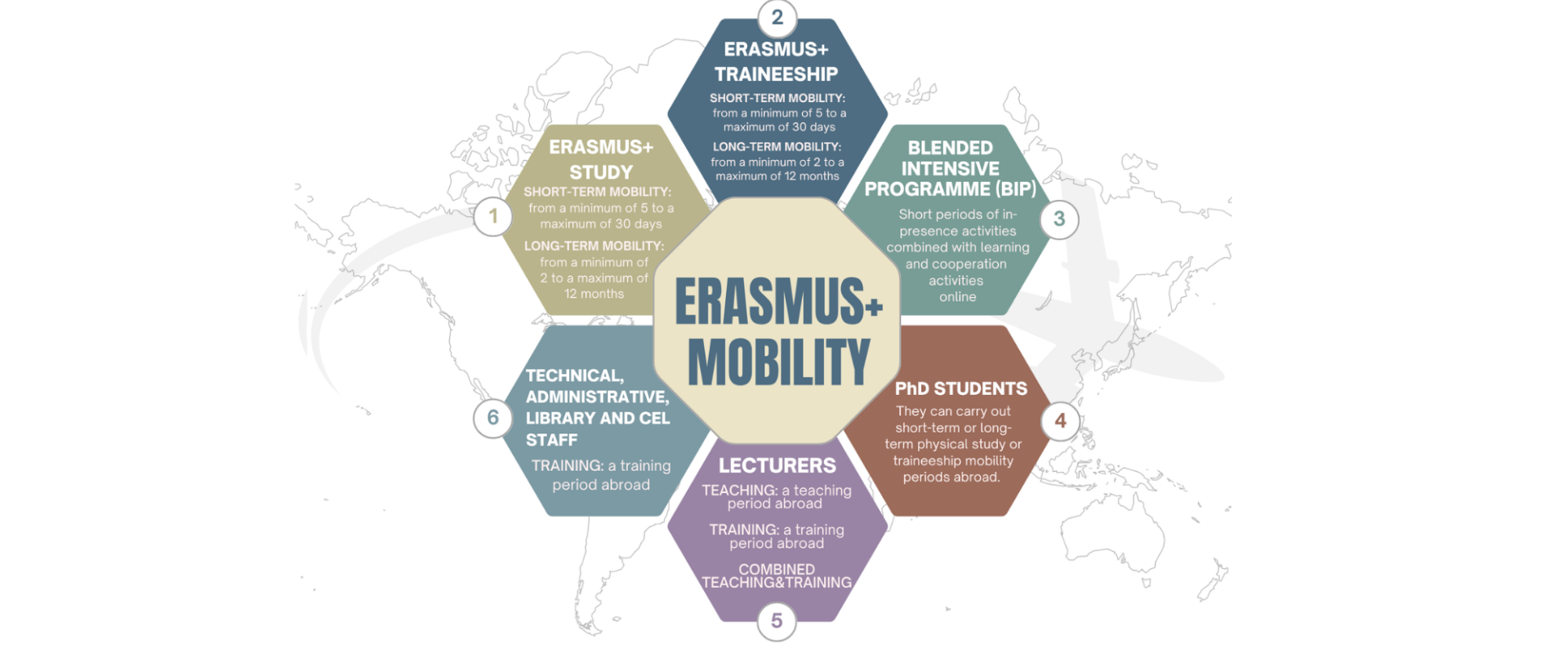The Erasmus Charter for Higher Education (ECHE) is the prerequisite that higher education institutions in the European Union must obtain in order to participate in individual learning mobility programmes and cooperation programmes for innovation and good practices. The Charter contains the fundamental principles and minimum conditions that institutions must respect in carrying out the activities envisaged by European programmes.
ECHE 2021-2027 & Erasmus Policy Statement
The Università Mediterranea has obtained the ECHE 2021-27 for the implementation of the Erasmus+ Programme by planning in the Erasmus Policy Statement (EPS) its general cooperation intentions and the measures and actions to be undertaken to comply with the principles contained in the Erasmus University Charter.
Erasmus Policy Statement (EPS)
The European Commission's Erasmus+ 2021-2027 programme offers funding for mobility: scholarships for students, teaching and administrative staff, as well as the opportunity to participate in numerous EU educational projects.
Academic exchange (studies and mobility of teaching and administrative staff) is possible when the partner institutions have signed an Erasmus+ bilateral agreement:
Brochure ITA Erasmus+ Mobility UNIRC
Opening hours to the public on the days and at the times listed below:
- Tuesday from 9.00 to 11.00 and from 15.00 to 16.00
- Wednesday from 9.00 to 11.00
For online support on Microsoft Teams:
- Monday from 9.00 to 11.00 (by appointment)
Email: [email protected]
As part of cooperation with the countries participating in the program, students and employees of the Università Mediterranea di Reggio Calabria can obtain a mobility grant.
The Erasmus+ program supports student mobility in all fields and study cycles. Students can study abroad at a partner higher education institution or complete an internship at a company, research institute, laboratory, organization, or other suitable workplace abroad.
As part of this initiative, all teaching and administrative staff at the Università Mediterranea di Reggio Calabria Reggio Calabria can apply for Erasmus+ funding in various calls. Erasmus+ funding aims to support staff participation in professional development activities abroad.
European Union (EU) Member States: Belgium, Bulgaria, Czech Republic, Denmark, Germany, Estonia, Ireland, Greece, Spain, France, Croatia, Italy, Cyprus, Latvia, Lithuania, Luxembourg, Hungary, Malta, Netherlands, Austria, Poland, Portugal, Romania, Slovenia, Slovakia, Finland, Sweden.
Non-EU countries participating in the Programme: Republic of North Macedonia, Serbia, Iceland, Liechtenstein, Norway, Türkiye.
As part of cooperation with partner countries, it is possible to co-finance the mobility of students (studies) and employees of the Mediterranean University of Reggio Calabria (teaching and training trips).
Erasmus+ agreements with partner countries are signed when a KA171 project is approved.
The project's scientific coordinator plans the mobility activities to implement the project and, with the support of the university offices, outlines the selection processes.
Third countries not associated with the Programme:
Region 1 – Western Balkans: Albania, Bosnia and Herzegovina, Kosovo, Montenegro.
Region 2 – Eastern Neighborhood: Armenia, Azerbaijan, Belarus, Georgia, Moldova, Territory of Ukraine recognized by international law.
Region 3 – Southern Mediterranean countries: Algeria, Egypt, Israel, Jordan, Lebanon, Libya, Morocco, Palestine, Syria, Tunisia.
Region 4 – Russian Federation: Territory of Russia recognized by international law.
Region 5 – Asia: Bangladesh, Bhutan, Cambodia, China, Democratic People’s Republic of Korea, India, Indonesia, Laos, Malaysia, Maldives, Mongolia, Myanmar/Burma, Nepal, Pakistan, Philippines, Sri Lanka, Thailand, and Vietnam
High-income countries: Brunei, Hong Kong, Japan, Korea, Macao, Singapore, and Taiwan.
Region 6 – Central Asia: Afghanistan, Kazakhstan, Kyrgyzstan, Tajikistan, Turkmenistan, Uzbekistan.
Region 7 – Middle East: Iran, Iraq, Yemen
High-income countries: Saudi Arabia, Bahrain, United Arab Emirates, Kuwait, Oman, Qatar.
Region 8 – Pacific: Fiji, Cook Islands, Marshall Islands, Solomon Islands, Kiribati, Micronesia, Nauru, Niue, Palau, Papua New Guinea, Samoa, Timor-Leste, Tonga, Tuvalu, Vanuatu High-income countries: Australia, New Zealand.
Region 9 – Sub-Saharan Africa: Angola, Benin, Botswana, Burkina Faso, Burundi, Cabo Verde, Cameroon, Chad, Comoros, Congo, Côte d'Ivoire, Eritrea, Eswatini, Ethiopia, Gabon, Gambia, Ghana, Djibouti, Guinea, Guinea-Bissau, Equatorial Guinea, Kenya, Lesotho, Liberia, Madagascar, Malawi, Mali, Mauritania, Mauritius, Mozambique, Namibia, Niger, Nigeria, Central African Republic, Democratic Republic of the Congo, Rwanda, Sao Tome and Principe, Senegal, Seychelles, Sierra Leone, Somalia, South Africa, Sudan, South Sudan, Tanzania, Togo, Uganda, Zambia, Zimbabwe.
Region 10 – Latin America: Argentina, Bolivia, Brazil, Chile, Colombia, Costa Rica, Ecuador, El Salvador, Guatemala, Honduras, Mexico, Nicaragua, Panama, Paraguay, Peru, Uruguay, and Venezuela.
Region 11 – Caribbean: Antigua and Barbuda, Bahamas, Barbados, Belize, Cuba, Dominica, Jamaica, Grenada, Guyana, Haiti, Dominican Republic, Saint Kitts and Nevis, Saint Vincent and the Grenadines, Saint Lucia, Suriname, and Trinidad and Tobago.
Region 12 – Industrialized countries: Gulf Cooperation Council countries: Saudi Arabia, Bahrain, United Arab Emirates, Kuwait, Oman, Qatar.
Region 13 – Other industrialized countries: Australia, Brunei, Canada, Chile, Hong Kong, Japan, (Republic of) Korea, Macao, New Zealand, Singapore, Taiwan, United States of America, Uruguay.
Region 14: Faroe Islands, Switzerland, United Kingdom.
The partner countries with which the University will collaborate in the 2025/2026 academic year:
- UNIVERSITETI POLIS SHPK of Albania;
- UNIVERSITE EURO-MEDITERRANEENNE DE FES of Morocco.


